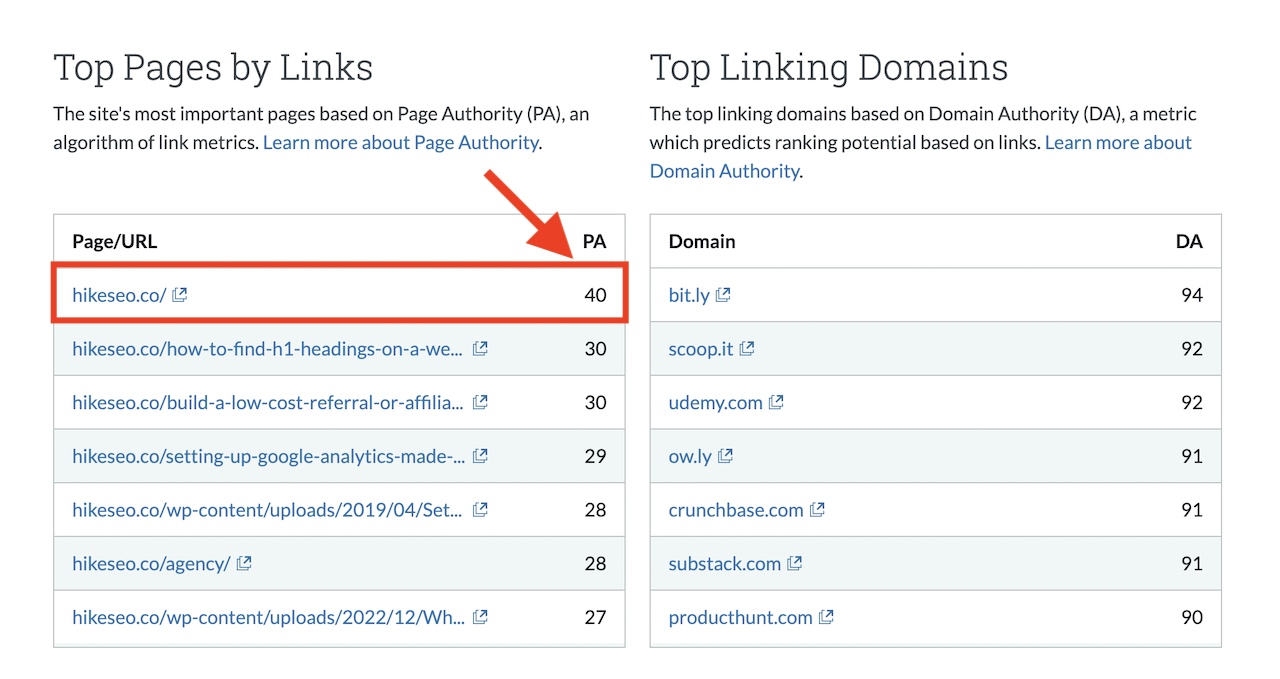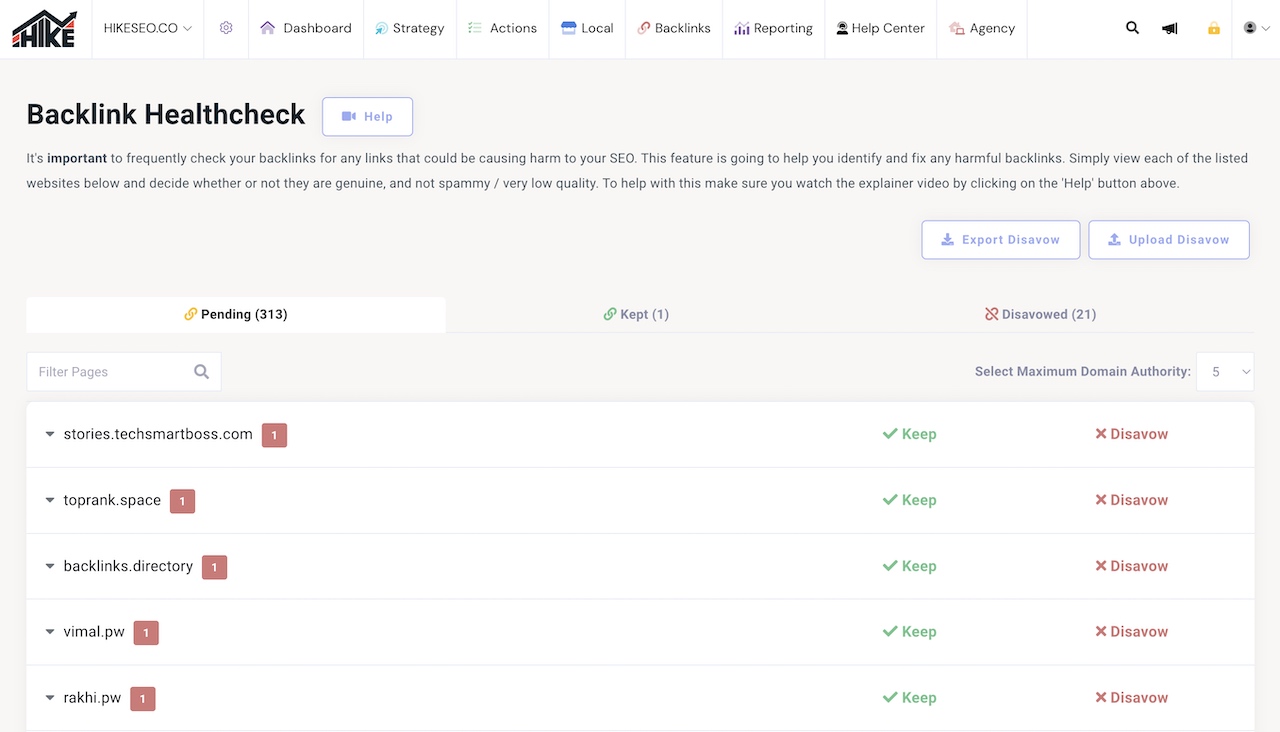Page Authority: A Beginner’s Guide
What is Page Authority?
Page Authority (PA) is a metric developed by Moz that predicts how well a single web page will rank on search engine result pages (SERPs). It's measured on a scale from 1 to 100, with higher scores indicating a greater potential to rank.
The Page Authority score considers numerous elements, including the number of high-quality backlinks directing to a single page, the page & site’s overall credibility, and its relevance within a specific industry or niche, among other factors.
For example, Hike SEO at the time of publishing, the homepage had a PA score of 40 out of 100.

Why is Page Authority Important?
Benchmarking
PA provides a numeric representation of a webpage's likelihood to rank higher in search engine results. It allows for comparing the strength or potential of pages against competitors or similar pages within a domain.
It also helps to track progress and serves as a benchmarking tool to monitor and evaluate the impact of optimization efforts over time. Tracking changes in PA scores helps understand the effectiveness of SEO changes implemented on a webpage. A consistent increase in PA may indicate improvements in content quality, backlink profile, or overall website authority.
Backlink Prospecting
Page Authority aids in evaluating potential backlink sources. Pages with higher PA scores generally indicate stronger authority and credibility. When prospecting for backlinks, focusing on pages with high PA can improve the chances of acquiring valuable links that positively impact a page’s and site's own authority and search rankings.
This allows for prioritizing outreach efforts so that focus can be put on websites/pages with higher PA scores as these are more likely to contribute significantly to improving a site's authority when acquiring backlinks.
How is Page Authority Calculated?
Page Authority (PA) is determined through Moz's algorithm and is calculated on a logarithmic scale ranging from 1 to 100. Although the exact details of the algorithm remain secret, several elements are taken into account to ascertain a webpage's Page Authority. These likely involve factors such as the number of linking domains, the quality and authority of those links, traffic directed to those domains, and other proprietary trust scores.
How To Check Page Authority
A website’s domain authority can be checked through Moz’s Authority tool, or using a third-party Page Authority Checker tool.
How Often Should I Check My Page Authority?
Glad you asked! Since page authority is a metric that takes time to change, it is recommended to check PA of selected pages at most once a month. This ensures that any backlinks that have been created during 30 days have time to be picked up and influence the PA of your page(s).
What is a Good Page Authority Score?
Page Authority should always be reviewed in context by comparing against direct competitors or similar websites within your niche rather than aiming for an absolute score. In highly competitive industries, achieving a PA score higher than competitors can be considered good.
As a benchmark, a PA score of 50 or above is generally considered decent or good. But this can vary widely depending on the industry. Some industries or niches might have websites with significantly higher average PA scores due to strong competition and extensive link-building efforts.
Brand new pages that have no previous backlinks start out with a PA of 0 out of 100. As the page gains authority through acquiring high-quality backlinks, the PA score tends to increase over time.
Remember, the score is calculated using a logarithmic scale, which means it’s much harder to go from 40 to 50 than from 10 to 20, for example.
How To Increase Page Authority
It takes consistent effort, patience, and time to build up page authority. It’s not only the number of backlinks, but more importantly, the quality & relevance of the backlinks that point to the page that are important. Here are a few tips on how to best increase page authority:
Quality over Quantity
First make sure that the backlink(s) you’re about to secure are high quality, are relevant to the topic of the page and website industry, and have established credibility. Then as you add more of these types of backlinks over time, the more you receive, the better.
Analyze Backlinks
Before deciding to secure a backlink from a particular page or website, conduct a thorough page & domain analysis to ensure its credibility and authority. Evaluate the page authority, domain authority, industry relevance, content quality, social media engagement, traffic metrics, and other indicators that affirm the page’s and website's quality.
Looking at your existing backlinks on a page should also be an important step to highlight any low-quality backlinks that would be better removed than kept. This ensures a high-quality backlink profile that will continue to support your SEO performance in the long term. If a low-quality backlink is spotted and it’s unable to be removed by contacting the webmaster of the site, then the last resort would be to disavow that link.
Create Quality Content
Ultimately, content that adds value to the target audience and is worth sharing & linking sets the page up to attract natural backlinks from real sources that can build page authority automatically, over time.
How do you determine whether content is high quality or not? A good strategy is to read the top-performing content for that topic of the page you wish to create or enhance and ask yourself a few good questions such as: What points within that topic do they cover? What questions do they answer? How comprehensive is the content? How engaging is the layout?
Then use these insights as inspiration to match or exceed the quality of their content.
Compare Your Site To Your Competitors
When viewing your Page Authority, look at the number in relation to your competitors’ ranking pages as this gives you proper context to understand how much higher your PA score should be to start gaining more ranking strength. Just because you have a PA of 10, doesn’t mean it’s a low score. If your competitors have PA scores of less than 10, that means your page has a higher chance of ranking over your competitors.
See Where Competitors Get Their Backlinks
Tools such as Hike SEO can support you in discovering backlinks that your competitors have built, giving you insights into potential opportunities for backlinks to your pages. Websites that link to multiple competitors indicate that they are an easier opportunity to link from as that website is willing to link to multiple websites in the same industry and doesn’t necessarily prefer one over the other.
Read more about additional backlink-building strategies in our dedicated article about this topic.
Why Does Page Authority Change?
The ever-changing nature of the web causes Page Authority to fluctuate over time. As links are consistently added, removed, and modified, a page's backlink profile undergoes changes, thereby impacting its Page Authority. Eliminating backlinks can lead to a decline in page authority while adding new ones has the potential to increase the page's PA. Every backlink, regardless of its size, contributes to the PA score.
Page Authority vs. Domain Authority
Page Authority measures the probability of ranking each of the pages individually while Domain Authority measures the probability of ranking an entire web domain.
Page Authority is influenced by the quality & number of links that point to a specific page, while Domain Authority looks at all of the backlinks that point to every page across the domain.
Hike SEO
By using an all-in-one SEO platform like Hike, you can use its beginner-friendly tools to view your backlink profile and the authority of each of those websites. You can also view your competitor’s backlinks and see how authoritative each of the links is, and if there are any overlaps between the competitors.
For example, below you'll see Hike's Backlink Healthcheck tool that flags up any backlinked domains that have an authority score of 1 out of 10. These can be then reviewed to spot any spammy links that require removal or disavowal.

If you haven’t yet tried Hike, sign up today and see how easy it is to become empowered to take control of your SEO.